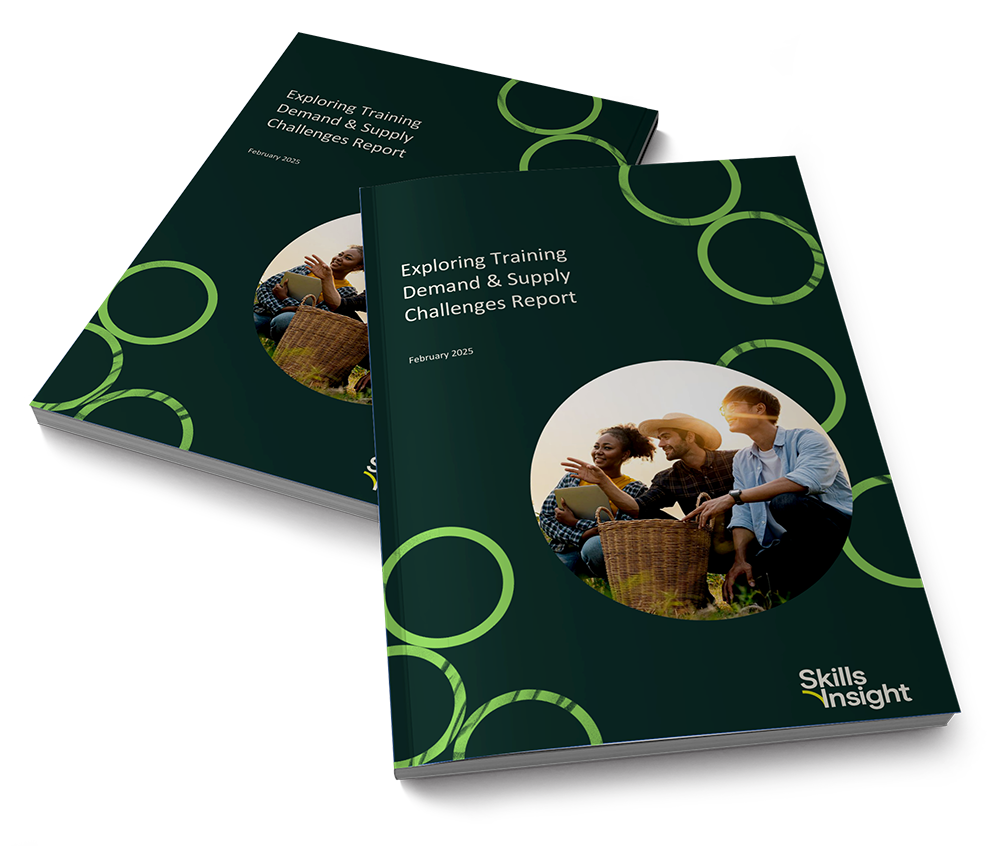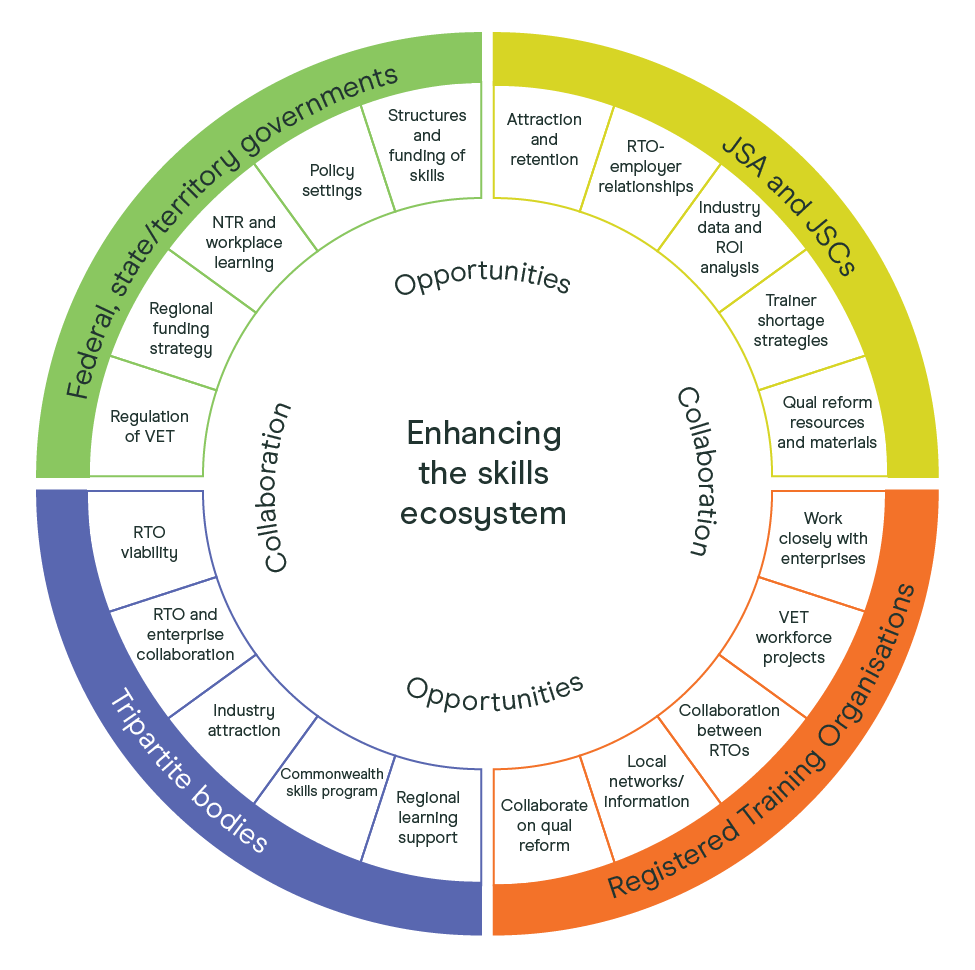Formal VET training plays a crucial role in preparing people for employment opportunities, upskilling people in employment, and supporting employers to secure a skilled workforce. However training delivery (supply) is not always available where it is needed, for a multitude of reasons, and when it is not supplied, demand for training is hidden.
Click across the tabs to view active and completed project stages. Consultation takes place at every stage of the project.
It can be difficult to gauge the true demand for training from uptake or enrolments in a qualification. A host of factors might prevent registered training organisations (RTOs) from offering a qualification, so even though industry needs the training supplied, it may not be available for enrolment. Similarly, learners or employers may experience barriers to engaging with formal training that are not related to the qualification itself. The challenges for all parties can be particularly pronounced in rural, regional and remote areas.
This project will explore the factors impacting the visibility of demand and the delivery and uptake of VET training to produce a research paper outlining the challenges faced and recommendations for potential solutions. It will build on similar research undertaken in 2020 incorporating developments in the VET system, training delivery and the workforce over the past four years.
84
the number of nationally endorsed qualifications with enrolments that are considered low, from the industries Skills Insight supports . There is no option to enrol in at least 24 of these, because the training isn’t being offered.
Project scope
The project will focus on 13 industry areas, where there is evidence of low enrolment qualifications (less than an average of 40 enrolments over a 3-year period). In total 41 qualifications have been identified in the following areas:
Initial consultation will take place in Victoria during the development stage to test the approach. This will include focus groups, on site interviews and online interviews with stakeholder from the following industry areas: arboriculture, permaculture, horticulture and forestry and wood products. There will then be the opportunity for consultation nationally as part of the broad consultation stage.
Key questions
Subscribe for updates
If you would like to receive updates about this project, please subscribe to our newsletter and select ‘General news’ as one of your industries of interest.
Timeline

Project team

Ngaire Stratton
Project Manager, Skills Insight
[email protected]

Mark Fletcher
Researcher, Skills Insight

This project involves a range of activities, some of which are being undertaken by ForestWorks as part of their collaborative partnership with Skills Insight. ForestWorks has an enduring and strong connection working with the forestry, timber, paper, fibre and furnishing industries and will work on this project where it relates to these industries.
True demand for training is not always possible to gauge from qualification enrolment data alone. Registered training organisations (RTOs) face challenges in delivering qualifications, meaning they may not be able to supply training everywhere it is needed. Even where qualifications meet industry needs and are available to enrol in, learners or employers may experience barriers to engaging with formal training. In rural, regional and remote areas, delivery and engagement in formal VET training can be especially challenging.
Consultation is underway as part of this project to explore the factors impacting the visibility of demand, challenges with delivery and barriers to uptake of VET training. The project approach is currently being tested in Victoria with stakeholders from the arboriculture, permaculture, protected and production horticulture, and saw technology industries. This has included focus groups, on site interviews and online interviews with relevant trainers, employers, industry organisations and unions. This will allow us to refine the approach before broad consultation from June to September.
During this stage, the forest and wood products and pulp and paper industries were identified for inclusion in the project. Challenges in these industries have been examined by ForestWorks with extensive industry consultation. The findings from this work will be incorporated into the approach and findings of this current project. For more information see: the Improving Enrolments Project and Forestry Workforce Training Program Scoping Study November 2023.
Next steps
During the broad consultation stage, the project team will undertake discussions with stakeholders around the country across all 13 industry areas that are part of this project. We want to hear from stakeholders about what factors are impacting supply and demand for each qualification and what strategies might help address these challenges.
Consultation will be followed by a period of review and analysis to determine if any further investigation is required. Your insights will then be used to produce a research paper outlining the challenges faced and recommendations for potential solutions. The research paper will be submitted to DEWR in November 2024, with potential for future projects as a result.
Links to register for consultation opportunities taking place as part of the broad consultation stage will be available on this webpage soon. In the meantime, you are welcome to contact the project manager, Ngaire Stratton [email protected]
Subscribe for updates
If you would like to receive updates about this project, please subscribe to our newsletter and select ‘General news’ as one of your industries of interest.
Industry areas & qualifications for consultation
Consultation has taken place throughout this project to explore the challenges related to delivery of and engagement with formal VET training.
Input has been collected from RTOs, employers, unions and industry organisations about barriers to delivering and engaging with formal training.
Thank you to everyone who participated in focus groups, on site interviews and online interviews between June and September. These activities took place nationally, across the 11 industry areas listed below, with the aim of gathering input from stakeholders about the factors impacting supply and demand for each qualification and what strategies might help address these challenges.
The project team are currently analysing the insights from this consultation and working on a research paper outlining the barriers to meeting training demand and recommendations for potential strategies to address them. This will be submitted to DEWR in November 2024, with the potential for future projects coming out of the project findings. The report will then be shared on this project webpage.
Timeline

Subscribe for updates
If you would like to receive updates about this project, please subscribe to our newsletter and select ‘General news’ as one of your industries of interest.
Consultation activities
See below for a list of activities undertaken.
Online interviews
Online interview were held to better understand the nuances impacting access to training in specific industry areas and regions.
On site interviews
On site interviews were held around the country in between focus groups.
Focus groups
The following focus groups took place around the country.
Victoria
Melbourne, Tuesday 25 June
Tasmania
Hobart, Monday 1 July
Hobart, Tuesday 2 July
Queensland
Brisbane, Monday 15 July
Brisbane, Tuesday 16 July
New South Wales
Newcastle, Monday 29 July
Sydney, Tuesday 30 July
Northern Territory
Darwin, Monday 12 August
Darwin, Tuesday 13 August
South Australia
Adelaide, Monday 26 August
Adelaide, Tuesday 27 August
Western Australia
Perth, Monday 2 September
Manjimup , Monday 2 September
Perth, Tuesday 3 September
Industry areas & qualifications for consultation
Skills Insight has undertaken consultations, research and analysis to uncover the factors impacting engagement with and delivery of formal VET training. The project team looked at 29 low-enrolment qualifications across 11 industry sectors, and interviewed 224 people across 11 industry sectors to explore what variables impact VET training supply and demand, what strategies might address training demand, and what variables and strategies are relevant to each industry.
Thank you to all the industry enterprises, sole traders, union representatives and registered training providers who volunteered their time and expertise.
The project team have collected insights from these consultations, along with research and analysis into a report that will support industry and government decision-making around addressing challenges in training demand and supply.
The report was accepted by the Department of Employment and Workplace Relations in February 2025.
Key findings
This research tells a story of invisible demand, an absence of supply and industry left without the training, and therefore skills, they need. Our conversations with stakeholders demonstrate that low enrolment numbers do not equate to a lack of need for training delivery. Rather, a range of factors may cause qualifications to not be delivered where they are needed. A range of complex issues emerged that inhibit training supply and affect demand including VET policies, funding, investment decisions, regulation, information flows, labour supply, business decisions and training viability considerations. The study also found that these factors are intensified in regional, rural and remote Australia.
When analysing the overarching issues experienced by all participants, the research divided findings into four themes. The report also analyses the specific factors impacting each of the industries included in this research, providing areas of opportunity for future work to address the issues impacting supply and demand.

VET governance, funding and regulation
The ‘multi-stakeholder’ nature of VET has contributed to a complex environment that stakeholders find challenging to understand and navigate. The variety and variability of funding sources make it difficult to plan long-term investments in facilities, infrastructure, staff, and training materials.

RTO delivery challenges
Where overwhelming barriers to delivery result in training not being offered (i.e. a lack of supply) there can be a false perception of low demand, which in turn impacts future supply, limiting the choices available to employers and learners. Trainer shortages, the cost of facilities required for practical training and assessment, and the cost and expertise required to develop training and assessment resources can all present significant barriers to delivery of qualifications.

Issues of industry attraction and career pathways
Many stakeholders reported that low enrolments were part of a broader issue of attraction and retention to the industry. Most industries included in this study have a large proportion of the workforce in regional, rural and remote locations, so need to attract new workers to both the industry and location.

Barriers to industry engagement in VET
Many businesses need the skills and knowledge that formal training provides, yet lack the time, resources, informational networks, and understanding of how valuable training can be to embrace opportunities as they arise. Some of the reasons enterprises struggled to engage in formal training included: having a seasonal or casual workforce, the time out from work required for study and travel, and a lack of understanding of the return on investment.

Specific impacts for regional, rural and remote Australia
The research highlights that most enterprises and RTOs in regional, rural and remote Australia are small or very small businesses, which significantly impacts the capacity to deliver training, engage in structured training programs and build partnerships. At the same time, it is shown that the labour markets in these areas are shifting towards both higher education qualification roles and occupations for which VET is the primary pathway.
Where from here?
The insights within this report provide important guidance for improving availability and engagement with formal training where it is needed. Although some employers make do without access to VET, this has impacts on worker safety, wellbeing and careers, as well as productivity and efficiency.
Throughout the report areas of opportunity were identified that may lead to improvements. Many of these require coordinated actions by governments, industry representatives, regulators and training providers, while others fall within the responsibilities of Jobs and Skills Australia and Jobs and Skills Councils to guide, plan, research or implement. The section of the report ‘VET actor opportunity to drive change’ asserts that a holistic view of the actors involved is required to drive improvements in the system. Key areas of responsibility have been provisionally allocated and should be considered further by the identified actors.
Following from the findings of this research, Skills Insight is undertaking initial investigations into a tool for analysing which of the identified factors are impacting supply and perceived demand of a particular qualification. This tool could be used to provide improved information to inform decision-making by all stakeholders.

